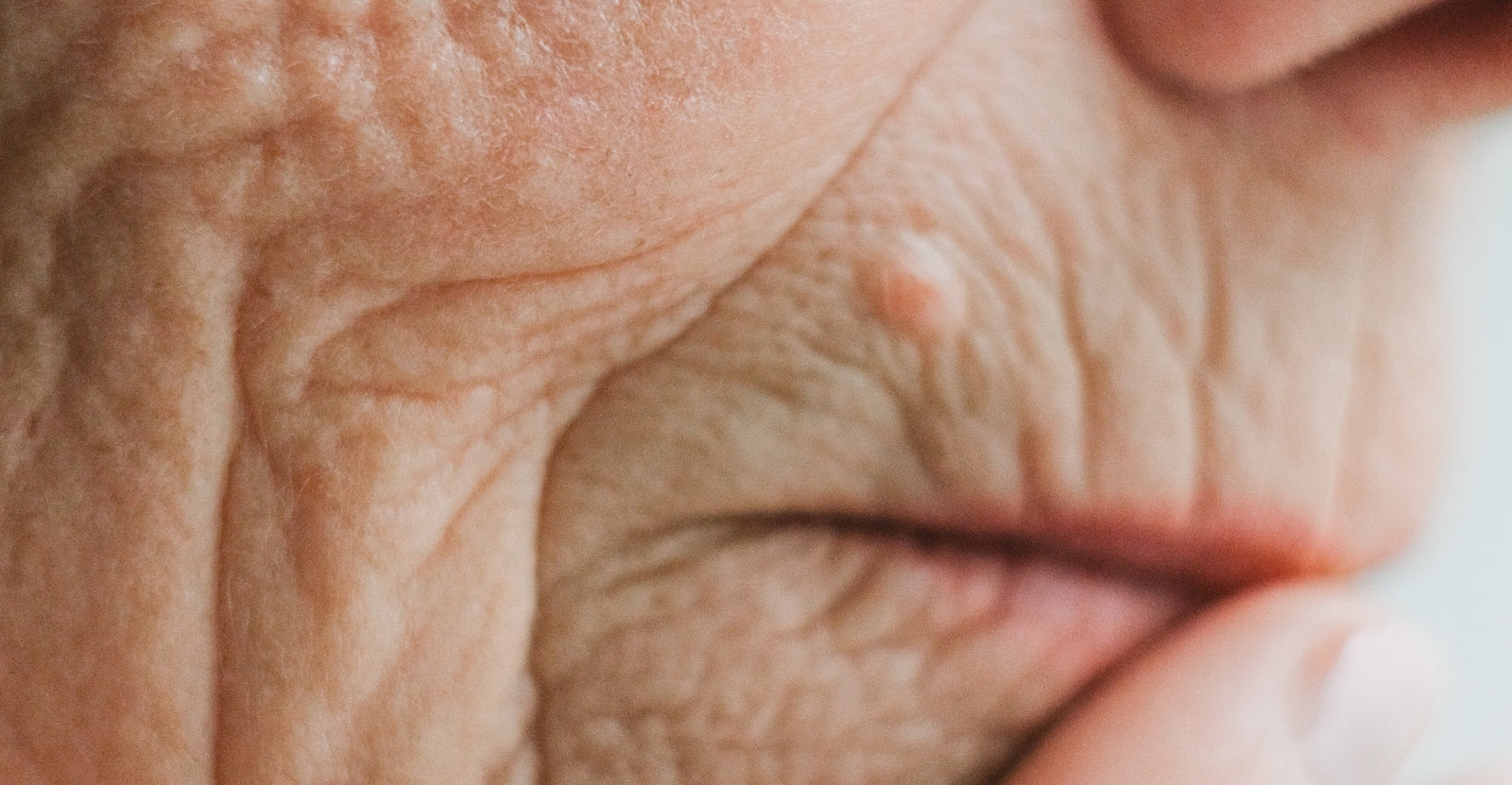CAUSES OF SKIN AGING
As we age, our skin undergoes various changes that result in wrinkles, fine lines, and a loss of elasticity [1]. These visible signs of aging can be attributed to a complex interplay of internal and external factors that affect our skin cells. While many biological processes are affected, they converge around autophagy, or the skin’s ability to recycle and renew itself on a cellular level [2]. In this article, we will explore how and why our skin cells age and discuss proven anti-aging therapies for each cause.
INTRINSIC AGING
Intrinsic aging, also known as chronological aging, is the natural aging process determined by our genetics and the passage of time [3]. Over the years, autophagy begins to decline, leading to thinner, less elastic skin. While intrinsic aging is inevitable, stimulating autophagy through intermittent fasting, exercise, deep sleep, a healthy diet, and ingredients such as resveratrol, turmeric, and retinoids can help slow down intrinsic aging [4]. Retinoids such as retinol and tretinoin also help stimulate collagen production, reduce fine lines, and improve skin texture. Other active ingredients that should be used in alternation with retinoids include chemical exfoliants like AHAs and BHAs.
UV RADIATION
Exposure to ultraviolet (UV) radiation from the sun is a major external factor contributing to premature skin aging [5]. UV rays damage the skin's collagen and elastin fibers, leading to sagging skin and the formation of wrinkles. Using broad-spectrum sunscreen with an SPF of at least 30 can protect the skin from UV damage [6]. Sunscreen should be applied daily, even on cloudy days, to prevent premature aging.
POLLUTION
Environmental pollution, including air pollutants and toxins, can damage skin cells and accelerate aging. These pollutants can generate free radicals, causing oxidative stress at a cellular level. Using skincare products containing antioxidants like vitamin C and vitamin E can neutralize free radicals and protect the skin from pollution-induced damage [7].
LIFESTYLE FACTORS
There is a long list of lifestyle factors known to accelerate skin aging including: smoking and excessive alcohol consumption, lack of sleep, poor diet, dehydration, and stress. Smoking narrows blood vessels in the skin, reducing blood flow and oxygen supply, while alcohol dehydrates the skin. Inadequate sleep can disrupt the skin's natural repair processes, leading to dull complexion, dark circles, and fine lines. A diet lacking essential nutrients can contribute to premature aging. Skin relies on vitamins and antioxidants to maintain its health and vitality. Lastly, chronic stress triggers the release of cortisol, a hormone that can break down collagen and elastin in the skin. Over time, this can lead to wrinkles and sagging.
We know that our lifestyles are often dynamic and sometimes, we aren’t doing a great job taking care of our skin the way we know we should. Thankfully, recognizing that our skin is a living organ connected to every other system in the body can help us see that the lifestyle choices we make are never isolated. Thankfully, research has revealed a number of active ingredients that also support aging and overall skin health including:
| Hyaluronic Acid | Green Tea Extract |
| Peptides | Resveratrol |
| Niacinamide (Vitamin B3) | Coenzyme Q10 |
| Ceramides | Copper Peptides |
| Growth Factors | Glycerin |
SKIN REJUVENATION
At a Medical Spa or Dermatologist’s office, there are many options to rejuvenate the skin and boost autophagy that are slightly more invasive than at home topicals. These include lymphatic drainage, chemical peels, cryotherapy, laser and light therapies, microneedling, platelet-rich plasma (PRP) facials, and really any combination of these techniques. Just remember to consult with a licensed skin care professional to understand the associated recovery time and expected results with each procedure.
CONCLUSION
Understanding how and why our skin cells age is crucial in combating the visible signs of aging. While intrinsic aging is a natural process, various external factors contribute to premature aging. Proven anti-aging therapies, such as sunscreen, retinoids, a nutrient-rich diet, stress management, and proper hydration, can help maintain youthful and healthy skin. Additionally, lasers, needles, and chemical peels can be used to gently disrupt an aged skin barrier and recruit the skin’s natural repair mechanisms for long lasting results.
Sources:
[1] Weihermann AC, Lorencini M, Brohem CA, de Carvalho CM (2017) Elastin structure and its involvement in skin photoageing.Int J Cosmet Sci 39, 241–247.
[2] Eckhart L, Tschachler E, Gruber F (2019) Autophagic Control of Skin Aging.Front Cell Dev Biol 7, 143.
[3] An In-Depth Review of Skin Aging Genes | Lifespan.io.
[4] Kafi R, Kwak HSR, Schumacher WE, Cho S, Hanft VN, Hamilton TA, King AL, Neal JD, Varani J, Fisher GJ, Voorhees JJ, Kang S (2007) Improvement of Naturally Aged Skin With Vitamin A (Retinol).Archives of Dermatology 143, 606–612.
[5] Gromkowska‐Kępka KJ, Puścion‐Jakubik A, Markiewicz‐Żukowska R, Socha K (2021) The impact of ultraviolet radiation on skin photoaging — review of in vitro studies.J Cosmet Dermatol 20, 3427–3431.
[6] Krutmann J, Schalka S, Watson REB, Wei L, Morita A (2021) Daily photoprotection to prevent photoaging.Photodermatol Photoimmunol Photomed 37, 482–489.
[7] Rattanawiwatpong P, Wanitphakdeedecha R, Bumrungpert A, Maiprasert M (2020) Anti-aging and brightening effects of a topical treatment containing vitamin C, vitamin E, and raspberry leaf cell culture extract: A split-face, randomized controlled trial.J Cosmet Dermatol 19, 671–676.
